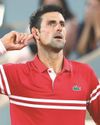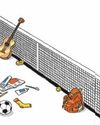After a breakthrough season, the young American is taking matters into her own hands.

Before her first press conference of 2016, Madison Keys walked into the interview room at the Australian Open with a baseball cap pulled backwards over her head, a string of earrings down each lobe and a tiny silver stud in her nose. Her hair, still wet after a shower, hung down over her shoulders. Earlier that afternoon, after shaking off some rust and quieting a few butterflies, Keys had won her opening-round match at the year’s first major, and she couldn’t help flashing her trademark toothy grin as she leaned forward to banter with half a dozen members of the U.S. media.
It was a new year, and while these reporters had been chronicling Keys’ every move since her days as a forehand-pulverizing prodigy from Florida, this was in many ways a new player who sat before them.
Over the previous 12 months, Keys had cracked the Top 20 on tour and made herself a threat at the Grand Slam tournaments. Along the way, she had made many American tennis fans believe that there might actually be a future for the sport in this country after Serena Williams retires.
Yet in the off-season, Keys had surprised the tennis world by splitting with former No. 1 Lindsay Davenport, the coach who many credited with her breakthrough. She hired a new, full-time team. Keys would be 21 the following month—had she left her slyly, shyly sarcastic teenage self behind? Maybe. Or maybe not. Asked how her new coach, former ATP tour pro Jesse Levine, was “adjusting to women’s tennis,” Keys’ grin narrowed to a wry smirk.
“He’s been fine…so far,” she says with an ironic twinkle in her eye. “There’s been a couple of times when he hits super, super spinny, and I’m like, ‘You can’t do that. No one [on the WTA tour] hits like that. Please stop.’”
Diese Geschichte stammt aus der March - April 2016-Ausgabe von Tennis.
Starten Sie Ihre 7-tägige kostenlose Testversion von Magzter GOLD, um auf Tausende kuratierte Premium-Storys sowie über 8.000 Zeitschriften und Zeitungen zuzugreifen.
Bereits Abonnent ? Anmelden
Diese Geschichte stammt aus der March - April 2016-Ausgabe von Tennis.
Starten Sie Ihre 7-tägige kostenlose Testversion von Magzter GOLD, um auf Tausende kuratierte Premium-Storys sowie über 8.000 Zeitschriften und Zeitungen zuzugreifen.
Bereits Abonnent? Anmelden

The Tennis Conversation: Jenson Brooksby, a piano man
Billy Joel may be a New York City icon, but the fans in Queens should start getting to know this piano man

The Five-Step Sit-Down Plan
Don’t neglect the value of a smart changeover routine

MAKING THE TURN
Six years after saying goodbye to the protour grind, Mardy Fish may be more active than ever—on the court, on the course, and helping combat a struggle anyone can encounter

FOOD FOR THOUGHT
Queens is known for its gastronomy as much as its tennis. Daniil Medvedev, equal parts sugar and spice, hopes to add a unique flavor to the borough as he vies for his first major

SUMMER IN THE CITIES
Broadway may not re-open until mid September, but tennis offers its own brand of live theatre in the preceding months

REOPEN SEASON
The pandemic halted tennis as an up-close experience— but is now giving way to pandemonium among crowds. As the pro game reopens this summer and fans gather again, we’re realizing what we’ve been missing for so long

Court of Appeals
Resolving Your Rules Questions&Quarrels

An Open Mind: New York's Slam has no shortage of history, but it always evolves
In the last decade, Arthur Ashe Stadium got a roof, and a new Grandstand and Louis Armstrong Stadium debuted.

Those Fall Feels
The end of summer may be bittersweet, but getting lost amid the backroads of NEW ENGLAND adds a silver—and golden—lining to the season change. Pack a few sweaters along with your tennis kit and prepare for leaf-peeping, scenic drives and delicious autumnal ingredients to pair with your forehands
Court of Appeals
Resolving Your Rules Questions & Quarrels